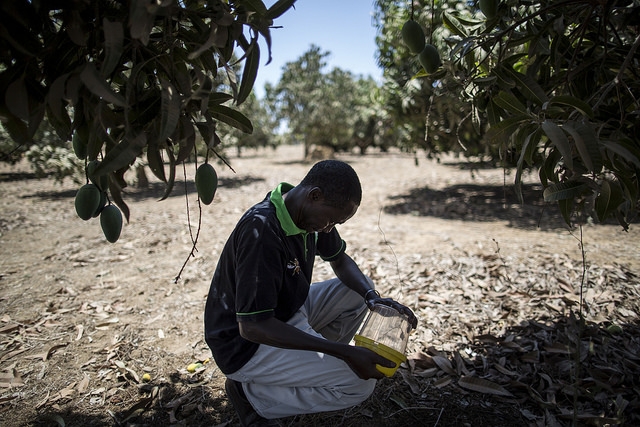Image

Expanding the initiative to control fruit fly in West Africa
STDF/PG/313
Start:
01/04/2010
End:
23/08/2011
Status
Completed
Project value (US$)
848,469
STDF Contribution (US$)
559,482
Beneficiaries
West Africa
Show more
Implementing entities
Centre de Coopération Internationale en Recherche Agronomique pour le Développement (CIRAD), France
Show more
Partners
World Bank Group
Show more
The goal of this project was to raise incomes of fruit and vegetable producers, particularly small producers, contributing to poverty reduction in West Africa. More specifically, the project aimed to control losses of fruit and vegetable due to fruit fly infestations by improving food safety at the production level.
A result story on the project is available here.
Fruit flies are a major problem for fruit production and trade in most West African countries, affecting not only the growing mango export industry, but also domestically consumed fruit varieties like citrus.
Preliminary studies brought a regional response to fight against fruit fly. This project falls within the scope of a regional initiative conducted by CIRAD and funded by the World Bank Group between 2008 and 2009, known as WAFFI ("Regional Initiative on the fight against fruit fly in West Africa"). The project built on and complemented other STDF-supported projects in West Africa (PG/255, PG/283, PG/287) to deepen the regional sensitization and training work and advance activities in eight pilot countries (Benin, Burkina Faso, Côte d'Ivoire, Ghana, Guinea, Mali, Togo and Senegal).
Preliminary studies brought a regional response to fight against fruit fly. This project falls within the scope of a regional initiative conducted by CIRAD and funded by the World Bank Group between 2008 and 2009, known as WAFFI ("Regional Initiative on the fight against fruit fly in West Africa"). The project built on and complemented other STDF-supported projects in West Africa (PG/255, PG/283, PG/287) to deepen the regional sensitization and training work and advance activities in eight pilot countries (Benin, Burkina Faso, Côte d'Ivoire, Ghana, Guinea, Mali, Togo and Senegal).
Decreased fruit fly infestation
Integrated Pest Management approaches were rolled out to improve long-term control of fruit fly populations. Support was provided for detection and trapping in mango and citrus fruits orchards. Remarkable drops in infestation were noticed in orchards where prophylactic methods were used.
Enhanced Research and Development on the best practices to tackle fruit fly
New methods to control fruit flies were tested in the field, in Northern and Central Benin. The experiences showed the most effective way (a mixture of "Nulure + Borax") to capture female fruit flies (ceratitis).
Enriched African Fruit Fly database
New data from West Africa on fluctuations in the Tephritidae species affecting the citrus industry was included in the WAFFI database, expanding the evidence base and supporting decision-making on fruit fly control.
Disseminated and improved knowledge and skills on prophylactic methods
Safe harvest methods were shown to limit development of the first generation of fruit flies in mango orchards. Producers improved their knowledge and skills on prophylactic methods through focus groups and demonstration sessions in orchards. In Benin and Ghana, producers' awareness was raised on the use of oecophyllous ants to fight against fruit fly through trial sessions and workshops. Trainings targeting technicians, producers, owners of orchards, their neighbors and the exporters, took place in each country. Scientific articles were published to share the findings and experiences of the project more widely.
Integrated Pest Management approaches were rolled out to improve long-term control of fruit fly populations. Support was provided for detection and trapping in mango and citrus fruits orchards. Remarkable drops in infestation were noticed in orchards where prophylactic methods were used.
Enhanced Research and Development on the best practices to tackle fruit fly
New methods to control fruit flies were tested in the field, in Northern and Central Benin. The experiences showed the most effective way (a mixture of "Nulure + Borax") to capture female fruit flies (ceratitis).
Enriched African Fruit Fly database
New data from West Africa on fluctuations in the Tephritidae species affecting the citrus industry was included in the WAFFI database, expanding the evidence base and supporting decision-making on fruit fly control.
Disseminated and improved knowledge and skills on prophylactic methods
Safe harvest methods were shown to limit development of the first generation of fruit flies in mango orchards. Producers improved their knowledge and skills on prophylactic methods through focus groups and demonstration sessions in orchards. In Benin and Ghana, producers' awareness was raised on the use of oecophyllous ants to fight against fruit fly through trial sessions and workshops. Trainings targeting technicians, producers, owners of orchards, their neighbors and the exporters, took place in each country. Scientific articles were published to share the findings and experiences of the project more widely.
Deepening research and field trials to tackle fruit fly
More research and field trails are needed over a longer period to evaluate other options to control fruit flies and identify cost-effective solutions.
More research and field trails are needed over a longer period to evaluate other options to control fruit flies and identify cost-effective solutions.
Beneficiaries
Close
Partners
Close
Implementing Entities
Close